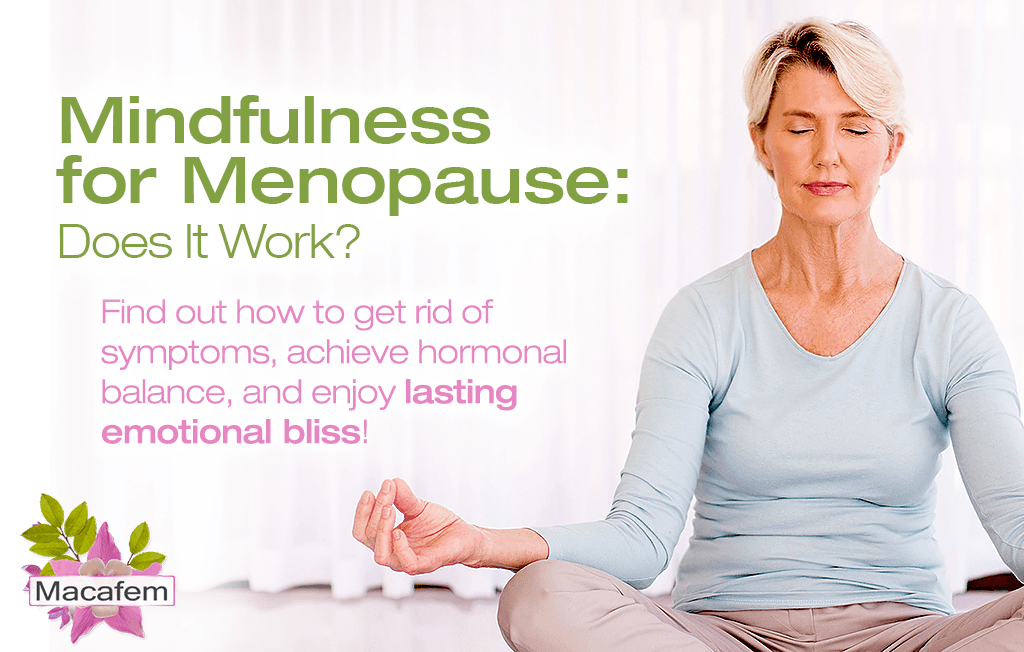Mindfulness for Menopause: Does It Work?
Desperate for relief from bothersome symptoms, menopausal women are oftentimes ready to try literally anything. Meanwhile, the solution to their discomforts may lie in something seemingly as simple as being mindful. Sounds too good to be true?? Keep on reading to find out more about mindfulness for menopause, including what it is, what does science say about it, and how you can start reaping benefits from it today!

What Is Mindfulness?
There are numerous definitions of mindfulness out there, but most narrow it down to being in the present moment, without swinging between the future and the past.
In other words, mindfulness invites you to be fully aware of what’s happening in your body and the surroundings, whether it be thoughts, feelings, bodily sensations, noises, scents, etc.
Benefits of Mindfulness for Menopause: The Scientific Evidence
There were numerous research studies conducted on the benefits of mindfulness on human health, several of which are particularly relevant for menopausal women.
- A 2019 Mayo Clinic study, involving 1,744 middle-aged women, has found that higher mindfulness and lower stress levels were associated with lower menopause symptoms scores. These findings suggest that mindfulness can alleviate midlife discomforts.
- Another study recruited 110 late peri- and early postmenopausal who partook in a mindfulness training program, called Mindfulness-Based Stress Reduction (MBSR). The program has shown to reduce women’s bother and distress caused by hot flashes and night sweats.
In addition, researchers believe that practicing mindfulness helps achieve mental focus and emotional stability as well improve self-esteem, all of which can benefit menopausal women.
How I Can Start Practicing Mindfulness for Menopause?
Mindfulness can be practiced throughout the day simply by engaging in your daily tasks with the five senses: taste, smell, sight, hearing, and touch.
For example, as you drink your morning coffee, spend a few moments noticing the warmth of the cup in your hand, the scent that hits your nostrils, coffee’s color, its flavor in your mouth, and the sensation as the liquid moves down your esophagus.
Mindfulness is also very commonly practiced during meditation. While you don’t necessarily need a course to start meditating, doing so under guidance (at least in the beginning) can help you approach it with the right attitude and develop the skills that will help you carry on with it long-term.
There are countless mindfulness meditation courses on the internet, many of which are free of charge. Alternatively, you can browse books at the library and bookstore for some easy tips on starting your meditation practice.
What Else Can I Do to Relieve Symptoms?
As you dive into mindfulness and become more calm, there’s one thing that can tremendously improve the outcomes of your efforts: achieving hormonal balance. And Macafem will help you do that like no other supplement!
Made of only natural ingredients, Macafem works by stimulating the body’s endocrine glands to optimize their hormonal production. Since it doesn’t introduce any outside hormones into the body, it can safely accompany you throughout the menopausal transition.
The midlife transition is known to be stressful for most women who struggle with uncomfortable symptoms and try to come to terms with the end of their fertile years. Luckily, practicing mindfulness and taking Macafem are a couple of the easiest and safest ways to give the body and mind a helping hand. So, give it a try, and get rid of pesky symptoms, achieve hormonal balance, and enjoy lasting emotional bliss.
Mayo Clinic. (2019). Mindfulness may ease menopausal symptoms. Retrieved February 10, 2022 from https://newsnetwork.mayoclinic.org/discussion/mindfulness-may-ease-menopausal-symptoms/
Medicine. (2020). A potential association of meditation with menopausal symptoms and blood chemistry in healthy women. Retrieved February 10, 2022 from https://www.ncbi.nlm.nih.gov/pmc/articles/PMC7478772/
Scientific Reports. (2018). Mindfulness-Based Stress Reduction (MBSR) or Psychoeducation for the Reduction of Menopausal Symptoms: A Randomized, Controlled Clinical Trial. Retrieved February 10, 2022 from https://www.ncbi.nlm.nih.gov/pmc/articles/PMC5919973/

